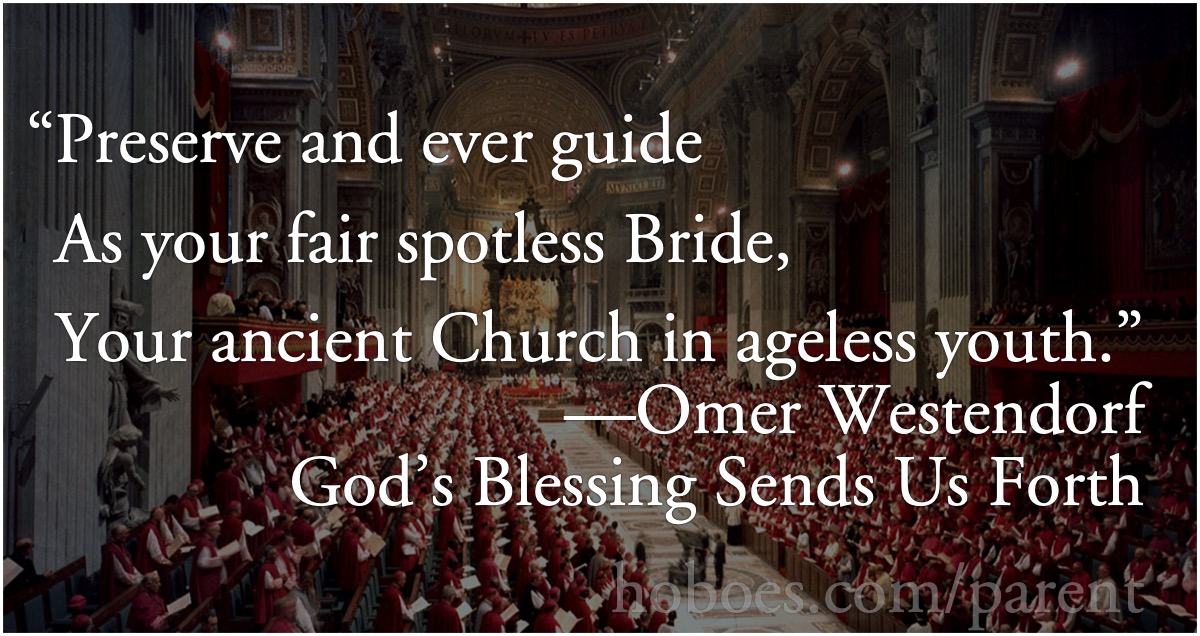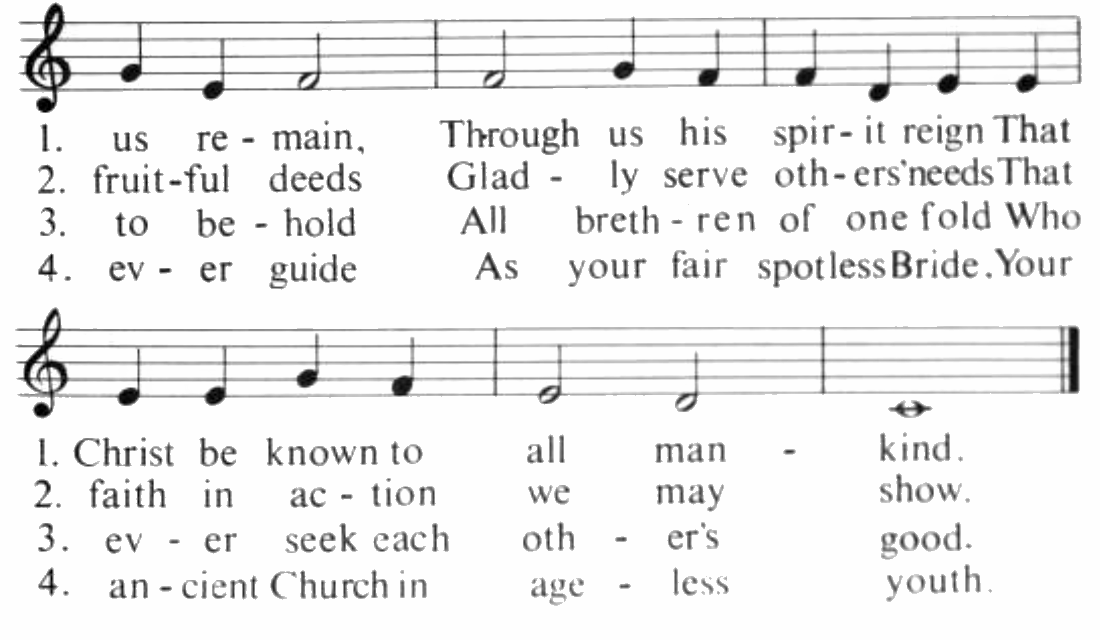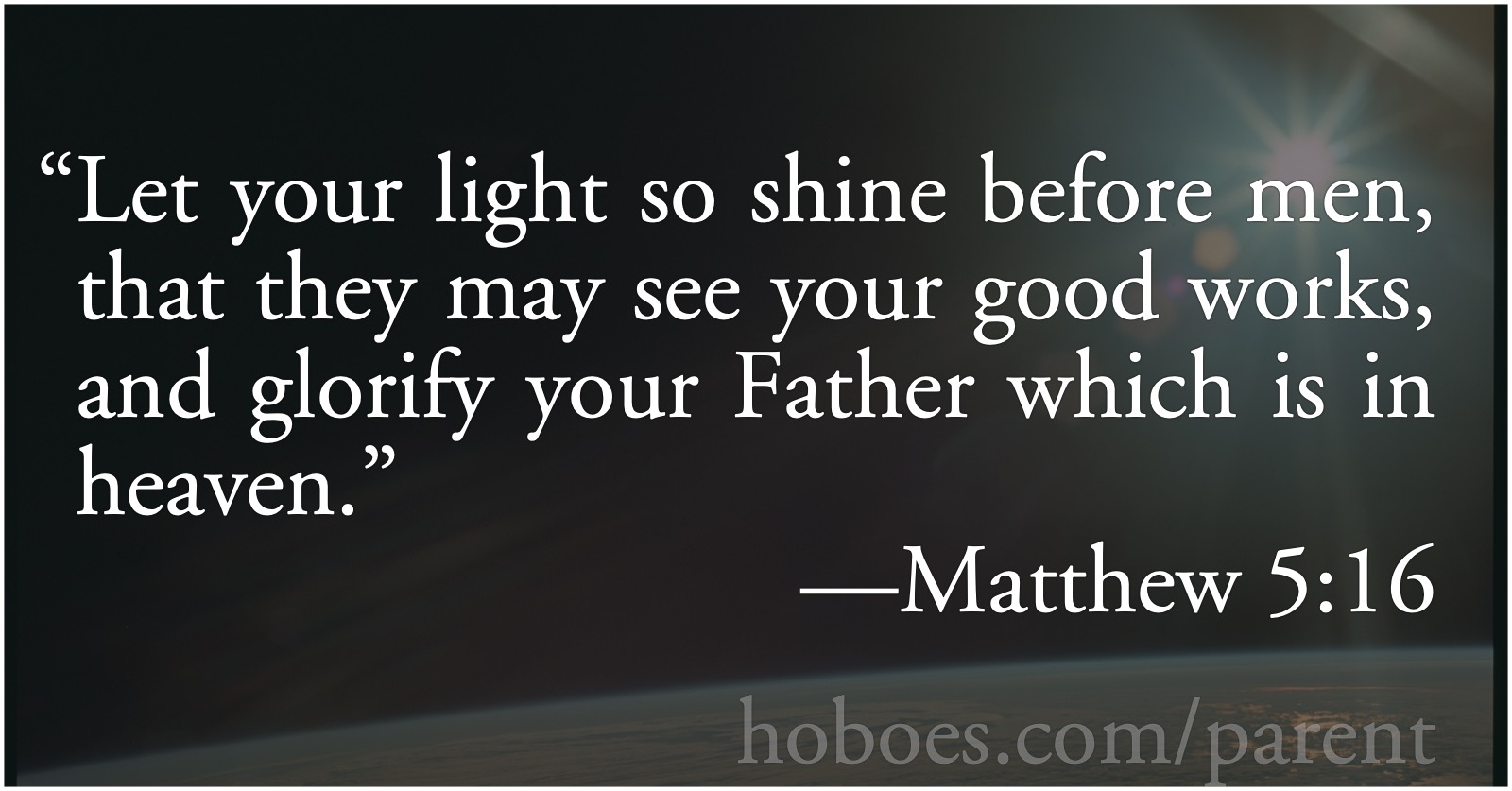Our parental unit, who art, somewhere, maybe

Omer Westendorf wrote many of his hymns in response to Vatican II. He deliberately chose his words to bring us closer to God. When hymnal bowdlerizers change his words, they’re changing that meaning. Westendorf’s God’s Blessing Sends Us Forth fares especially poorly under the bowdlerizer’s pen.
Like Where Charity and Love Prevail Westendorf wrote a modern song that speaks to modern issues. It has now been nearly completely depersonalized and has even had crucial teachings removed.
The spirit is no longer God’s spirit, but the Spirit: “May God with us remain, Through us his spirit reign” becomes “Through us the Spirit reign.” It’s both a serious change in meaning and an utterly silly one; it really does seem that the bowdlerizers are doing a global search on personal pronouns to remove them solely for the sake of removing them.
Where the bowdlerizers reduced the brotherhood of Christians in Where Charity and Love Prevail into a homogenous family, here they’ve gone and reduced the brotherhood of man to merely the people present at Mass. “So we are one in true brotherhood” becomes “So we are one as we share this food”.
The living bread we’ve been fed isn’t just the Eucharist. It is Jesus Christ himself, who died for all of us, not just the people singing the song and not just the people singing the song who also went up for the Eucharist. Westerndorf didn’t just realize this, he emphasized it. The bowdlerizers either don’t realize it, or don’t want us to believe it.
The change from “How gracious to behold all brethren of one fold” to “All people of one fold” would probably be innocuous on its own, but I just can’t trust people who would change…
- Preserve and ever guide
- As your fair spotless Bride,
- Your ancient Church in ageless youth.
to
- Bring us unto your side;
- Preserve and ever guide
- Your ancient church in ageless youth.
It is especially ironic that this comes after “Lord, you alone are unchanging Truth.” There are no unchanging Truths when the bowdlerizers get involved. The Church is no longer the Bride of Christ. It’s just some sort of ageless vampire, some roué with a Picture of Dorian Gray in their attic, living unchanged down through the centuries.
Even worse, however, is that “all mankind” is changed merely to “humankind”. I’m not just a cantankerous blogger. I’m also a cantankerous science fiction fan. “All mankind” means all intelligent creatures throughout the universe. Humankind means earthlings only. This is a natural use of the English language, because “mankind” has always meant “all intelligent creatures on Earth”, past and present.
“Humans” and “humankind” has always been specific to homo sapiens and only our closest homo- relatives on Earth. We have intelligent ancestors that were not humankind. And if we meet intelligent life elsewhere in the universe, it will not be human.
But it will be part of the brotherhood of mankind.
Did Westendorf recognize the universe-wide applicability of his language? Very likely so. This song first appeared in 1964, and the lyrics that start this verse begin with “Grant in this age of space…”.

The original final lines of Omer Westendorf’s God’s Blessing Sends Us Forth.
Westendorf wrote with the understanding that mankind would soon spread into the solar system and then into nearby solar systems. It’s one of those things like flying cars that people lament as a promise unfulfilled. In 1964 we were supposed to be at least on Mars and the moons of Jupiter by now.
There is this idea running through the UFO crowd that people will panic in the face of absolute proof that alien life exists, and that this is why governments hide this knowledge from us. Part of this belief is that ignorant religious, especially Christians, will panic the most. Governments, they say, need to have a plan in place to control Christians if we’re ever contacted by alien beings. Otherwise, Christians will riot in the face of first contact.
It reflects a severe misunderstanding of not just how Christians think, but of the history of how Christianity spread. Knowledge that life exists everywhere? Proof that God is awesome. Proof that it is possible to travel to other stars? Proof that God loves us. And an amazing opportunity to spread God’s word.
The bowdlerizers have jettisoned all of this meaning, all for a word that still ends in “mankind”. The bowdlerization of hymns is often so slapdash it’s humorous.
Of course, if we’re not spreading God’s word, proof of star travel and life on other stars isn’t such an amazing opportunity. We were just singing Jean A. Greif’s We Are the Light of the World. The lyrics of the refrain were changed from “May our light shine before men” to “May our light shine before all”. It’s an innocuous change. While it is perhaps slightly more stilted and forced than the original, it doesn’t significantly depersonalize or dehumanize the text, or make it more self-centered.
But it also either shows a near-complete ignorance of the Gospel that this lyric is based on or the bowdlerizers are deliberately moving away from the Gospel. While Matthew 5:16 is literally translated in most texts as “…let your light shine before men”, there are alternatives to a slapdash and careless search-and-replace if you dislike men as a word for mankind. The most obvious replacement for “before men” is “in the night”—if you know the Gospel this text was based on. The analogy, after all, is to a literal lamp, the lights of a city on a hill or the light of a lamp in a house.
13Ye are the salt of the earth: but if the salt have lost his savour, wherewith shall it be salted? it is thenceforth good for nothing, but to be cast out, and to be trodden under foot of men.
14Ye are the light of the world. A city that is set on an hill cannot be hid. 15Neither do men light a candle, and put it under a bushel, but on a candlestick; and it giveth light unto all that are in the house. 16Let your light so shine before men, that they may see your good works, and glorify your Father which is in heaven.
Someone serious about improving these lyrics might even change the entire line to something like “let our light never be hid” or “let our light shine in their sight”. The change they actually made looks more, once again, like a global search-and-replace against “men” with no regard for meaning or Gospel Truths.

But if you were serious, you probably wouldn’t remove any reference to convincing others to “turn from darkness and sin… to worship with us… [and] seek salvation in Christ”.
The modern, bowdlerized refrain is what used to be the Pentecost refrain, which is the only one that doesn’t involve a specific change in lifestyle. In the original, there’s also a refrain for Advent and Lent, for Epiphany, and for Passion and Easter. All four refrains begin with “We are the light of the world, may our light shine before men,” but they continue with:
| Advent, Lent: | That they may turn from darkness and sin, and give glory to God. |
| Epiphany: | That they may come to worship with us, and give glory to God. |
| Passion, Easter: | That they may seek salvation in Christ, and give glory to God. |
| Pentecost: | That they may see the good that we do, and give glory to God. |
We are the light of the world for a reason. We are not to hide our good works under a bushel, we want the world to see the good that we do, for a reason. That reason is so that the people of the world may turn from darkness and sin, that they may come to worship God with us, and seek salvation in Christ.
I should point out that I’m not averse to universalizing language. It’s just that the bowdlerizers make their changes so unnecessarily bland.
One of the things I worry about when I react this way against new lyrics is that I’m just used to the old lyrics, and so the new ones sound weird. After all, I’ve been singing the old lyrics for years. Perhaps if I grew up singing the new lyrics, they wouldn’t mean anything different.
But several weeks ago we sang James J. Chepponis’s very beautiful and touching With a Shepherd’s Care. Despite its beauty, it hits all but one of the red flags of a bowdlerized hymn. Specific words are stilted; those same words distance us from God; and they also distance us from mankind.
The only missing red flag is: I don’t remember ever singing any different lyrics. I don’t even remember singing With a Shepherd’s Care in the seventies. There’s a good reason for that: it was written in 1992. It’s a beautiful melody, but the way it refers to God is so incredibly stilted and forced, I had to check to see if it had been bowdlerized. It’s literally a song about God the Father—and yet refers to God as God throughout, without any mention of “He”.
It sounds like a joke, like the old Bob Dole jokes, with Bob Dole always referring to Bob Dole by name. I’ve seen beginning authors do this in novels, too, when they are absolutely terrified of using pronouns for fear of confusing the reader. It’s all “John Doe laughed. John Doe cried. And then John Doe danced.” Instead of “He laughed. He cried. He danced.”
Chepponis is a brilliant lyricist, but he appears to have internalized the bowdlerization of church music. He self-bowdlerized himself. I’m not sure but that self-bowdlerization isn’t worse than the bowdlerization of older music. If fearing any reference to a personal relationship with God has become so internalized among modern hymn-writers that they do it without thinking, we’re in a very bad place.
In response to Hymns: Musings about hymns, and about modern bowdlerism as it applies to Christian, especially Catholic, lyrics.
- Depersonalizing God in modern hymns
- Hymn publishers seem to be hell-bent on removing God and faith from the hymns we sing during mass. Where Charity and Love Prevail has removed almost all personal pronouns, and implies that our faith can change with the whims of the day.
- Gender Neutral Instructions
- Writing for all of your readers.
- Omer Westendorf: Tom Smith at Hymnary.org
- “Using his own name and several pen names, Omer composed numerous compositions for liturgical use, though his best-known works may be the texts for the hymns ‘Where Charity and Love Prevail,’ ‘Sent Forth by God’s Blessing,’ and especially ‘Gift of Finest Wheat.’”
- The Picture of Dorian Gray
- “From the point of view of form, the type of all the arts is the art of the musician. From the point of view of feeling, the actor’s craft is the type.”
More Hymns
- Light a candle for Christmas hymns
- While the holidays brought more examples of bowdlerized lyrics they also brought, at least to our church, a lit candle for the darkness, in the form of a new hymnal that retains sound Catholic theology.
- The Soul Felt It’s Worth
- “A thrill of hope, the weary world rejoices…” What is a soul worth? For God, a soul is worth his son.
- Let mortal tongues awake
- Samuel Francis Smith’s America—more commonly known as “My Country, ’Tis of Thee”— is short, direct, and a wonderful hymn to God as the soul of liberty. It’s a perfect hymn for the Fourth of July. It’s also very easy to play using the piano script from 42 Astounding Scripts.
- Though the Darkness Hide Thee
- Removing mankind from hymns makes them less inclusive and more self-centered. The new language almost always destroys the universality—the catholicity—of the older language. It also has a tendency to deny the necessity of God’s grace.
- Depersonalizing God in modern hymns
- Hymn publishers seem to be hell-bent on removing God and faith from the hymns we sing during mass. Where Charity and Love Prevail has removed almost all personal pronouns, and implies that our faith can change with the whims of the day.
- Four more pages with the topic Hymns, and other related pages
More modern bowdlerism
- Light a candle for Christmas hymns
- While the holidays brought more examples of bowdlerized lyrics they also brought, at least to our church, a lit candle for the darkness, in the form of a new hymnal that retains sound Catholic theology.
- Though the Darkness Hide Thee
- Removing mankind from hymns makes them less inclusive and more self-centered. The new language almost always destroys the universality—the catholicity—of the older language. It also has a tendency to deny the necessity of God’s grace.
- Depersonalizing God in modern hymns
- Hymn publishers seem to be hell-bent on removing God and faith from the hymns we sing during mass. Where Charity and Love Prevail has removed almost all personal pronouns, and implies that our faith can change with the whims of the day.

